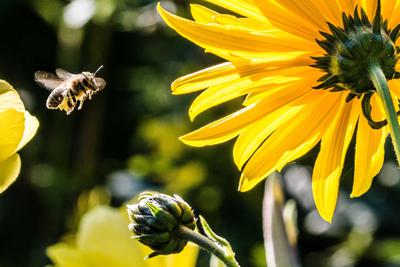Air pollution may be making it harder for bees and other insects to follow the scent of flowers, reducing pollination by as much as a third, new research suggests.
A team of British researchers exposed fields of black mustard to differing levels of ozone and nitrogen oxides, which are emitted with diesel exhaust, and observed the effect on local pollinators, including bees, moths, hoverflies, and butterflies. Scientists found a 14 to 31 percent reduction in pollination among plants exposed to polluted air. The results were published in the journal Environmental Pollution.
“We knew from our previous lab studies that diesel exhaust can have negative effects on insect pollinators, but the impacts we found in the field were much more dramatic than we had expected,” said Robbie Girling, associate professor of agroecology at the University of Reading and co-author of the study.
The findings suggest that air pollution could be a factor in the global decline of bees, which has been linked to the use of pesticides, herbicides, and rising carbon dioxide levels, and poses a significant threat to agriculture.
“The findings are worrying because these pollutants are commonly found in the air many of us breathe every day,” said James Ryalls, a research fellow at the University of Reading and lead author of the study. “We know that these pollutants are bad for our health, and the significant reductions we saw in pollinator numbers and activity shows that there are also clear implications for the natural ecosystems we depend on.”
ALSO ON YALE E360
Backyard Battle: Helping Native Bees Thrive in a Honeybee World



